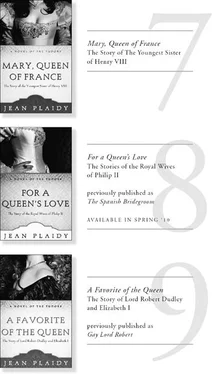Jean Plaidy - The Murder in the Tower - The Story of Frances, Countess of Essex
Здесь есть возможность читать онлайн «Jean Plaidy - The Murder in the Tower - The Story of Frances, Countess of Essex» весь текст электронной книги совершенно бесплатно (целиком полную версию без сокращений). В некоторых случаях можно слушать аудио, скачать через торрент в формате fb2 и присутствует краткое содержание. Жанр: Старинная литература, на русском языке. Описание произведения, (предисловие) а так же отзывы посетителей доступны на портале библиотеки ЛибКат.
- Название:The Murder in the Tower: The Story of Frances, Countess of Essex
- Автор:
- Жанр:
- Год:неизвестен
- ISBN:нет данных
- Рейтинг книги:3 / 5. Голосов: 1
-
Избранное:Добавить в избранное
- Отзывы:
-
Ваша оценка:
- 60
- 1
- 2
- 3
- 4
- 5
The Murder in the Tower: The Story of Frances, Countess of Essex: краткое содержание, описание и аннотация
Предлагаем к чтению аннотацию, описание, краткое содержание или предисловие (зависит от того, что написал сам автор книги «The Murder in the Tower: The Story of Frances, Countess of Essex»). Если вы не нашли необходимую информацию о книге — напишите в комментариях, мы постараемся отыскать её.
The Murder in the Tower: The Story of Frances, Countess of Essex — читать онлайн бесплатно полную книгу (весь текст) целиком
Ниже представлен текст книги, разбитый по страницам. Система сохранения места последней прочитанной страницы, позволяет с удобством читать онлайн бесплатно книгу «The Murder in the Tower: The Story of Frances, Countess of Essex», без необходимости каждый раз заново искать на чём Вы остановились. Поставьте закладку, и сможете в любой момент перейти на страницу, на которой закончили чтение.
Интервал:
Закладка:
His great fault was his impetuosity, coupled with his arrogance. He had believed that he might do what others dared not. When he had seduced Bess Throgmorton he had lost the Queen’s favor, because she could not endure that he should pay attention to any woman but herself. And a scandal that had been, with Bess pregnant and that other Bess, the all-powerful Gloriana, sending for him and insisting that he right the wrong he had committed and make an honest woman of her namesake.
And his Bessie had been a good wife, always beside him in his misfortune. Their son Walter was a fine boy and little Carew had been born in the Tower, for Bess had her apartments there with him that she might look after him as she swore his servants could not; and there she planned indefatigably to bring about his release.
He told Henry now that he was fortunate … for a prisoner, as he led the way on to the walk along the wall, which he was allowed to use in order to enjoy a little fresh air and exercise.
“How many prisoners enjoy such a privilege?” he asked. And Henry knew that he was eager to show him his new experiments in the hut at the end of the walk which he had been allowed to use for his scientific work.
Inside the hut was a bench on which were several substances in tubes and bottles.
“I’m working on an elixir of life,” he told the Prince. “If I perfect it, it may well be that people will be living many more years than they do at present.”
“You should have a fine mansion in which to work—not a hut,” said Henry.
“This serves its purpose. My remedies are becoming well known.”
“The Queen said that she had heard your balsam of Guiana was excellent.”
“I am honored. That balsam is much admired. Only yesterday the Countess of Beaumont, walking in the Tower, saw me on my walk and asked me to send her some.”
“Oh, you should be free. It is so wrong that my father should keep you here.”
“Hush! You speak treason. Why, my Prince, one little word can turn a free man into a prisoner. It is well to remember it. Tell me, what of the new beauty?”
“Carr?”
“I hear he is most handsome and struts about the Court in fine feathers.”
“He is most sumptuously clad now.”
“And the King delights in him. Well, the way seems smooth for him. A rich wife, I’ll warrant, who can bring him great estates and a great title…. Is aught wrong?”
“There is something I have to tell you, Sir Walter.”
“It disturbs you. Do not tell it.”
“But I must. I came to tell it.”
“And is it so bad then that it must be thrust aside?”
Henry nodded. “It is very bad. Walter, do you care very much for Sherborne Castle?”
Sir Walter had turned slightly pale though this was scarcely noticeable, so bronzed was he.
When he spoke, his voice was harsh. “Sherborne Castle? Why, that and my land about it is almost all I have left. I have consoled myself that if, by a royal whim, it should be decided that my turn has come to walk out to Tower Hill, Sherborne Castle and my lands will prevent my wife and sons from becoming beggars.”
Henry looked appealingly up at this man whom he so admired; then making a great effort he said: “My father had decided that Carr must have a great estate. He has offered him Sherborne Castle.”
Sir Walter did not speak; he went to the door of the hut and stood for some seconds on the Walk, staring at the gray walls and battlements.
Henry came out to stand beside him.
“If he had never come to Court, if there had not been an accident in the tiltyard—” Henry began.
Then Raleigh turned to smile at him.
“And if I had not been born, I should not be standing here now. Dear boy, do not say, If this and If that. Because that is life. I am robbed of my possessions. But remember this: I have already suffered a greater loss. My freedom. Yet I continue to live and work.”
Then they went together along the Walk, into the upper chamber of the Bloody Tower.
Never to either of them had it seemed so hopeless a prison.
THE CHILD BRIDE
T homas Howard, Earl of Suffolk, had taken time off from Court to visit his country estates, and he had a very special reason for doing so. Thomas Howard, like most of the members of his family, was a very ambitious man; they regarded themselves as the leading family and secretly believed themselves to be as royal as the Tudors and Stuarts. In the past many of them had not hesitated to make this known—to their cost. Suffolk believed he had learned wisdom through the misfortunes of his ancestors; his own father had gone to the scaffold because he had plotted to marry Mary Queen of Scots, and with such an example in the family, Suffolk had no intention of acting so foolishly.
His wife, Catherine, was with him; she did not care for life in the country but she was ready enough to be there on this occasion.
They sat together in the gracious room with the mullioned windows overlooking the parklands; and the expression on their faces showed a certain smugness. This expression was visible on the face of their companion, another member of the Howard family—in fact one might say the head of the House. This was Henry Howard, Earl of Northampton.
Northampton, a man well advanced in years, for he was nearer seventy than sixty, was at this time one of the most powerful men in the country. He had been playing the intricate game of politics so long that he performed with great skill, and in spite of his age he had no intention of relinquishing one small part of his power if he could avoid it.
Being a secret Catholic he greatly desired to bring Catholicism back to England, and his plan for doing this was to arrange a marriage between Prince Henry and the Infanta of Spain. Never for one moment was he insensible of the danger of his position. He had seen his elder brother lose his head; that made him very careful of his own.
Now, at his nephew’s home, he was on a very different mission; a pleasant, domestic one; but everything in the life of the Earl of Northampton, as was the case with his nephew Suffolk and his wife, had some political implication.
Northampton was saying: “This marriage will prove advantageous to us all. James is in favor of it, and while the Scot is a lumbering boor of a fellow, one must not lose sight of the fact that he happens to wear the crown.”
“He is anxious to do honor to any relation of Essex. No doubt he feels remorse because his predecessor, after pampering that young man, allowed his enemies to lop off his head.”
“Oh, the old Queen had to surround herself with handsome men whom she imagined were in love with her, but there were never two she favored so much as Dudley and Essex. The boy is a pleasant youngster. The union will be good for us all.”
“I have met young Robert. He shows promise. My only regret is that the children are so young.”
“What is it—Fourteen the boy—and the girl?”
“Frances is twelve,” said Lady Suffolk.
“Well she can go back to her lessons while young Robert goes abroad to complete his education. There’ll be no question of the consummation yet. I should like to see the child. It is time she was told of her good fortune.”
“I will send for her.”
A few minutes later Frances Howard came into the room. Approaching the group she stopped some little distance from them and dropped a deep curtsy, daintily spreading her blue skirts as she did so. Her gown became her well, but she was so beautiful that nothing could have detracted from her looks. Her long golden hair fell in curls to her waist; her skin was delicate in texture and color; her blue eyes large and darkly lashed.
Northampton thought: This is not merely a pretty child. This is a beauty.
Читать дальшеИнтервал:
Закладка:
Похожие книги на «The Murder in the Tower: The Story of Frances, Countess of Essex»
Представляем Вашему вниманию похожие книги на «The Murder in the Tower: The Story of Frances, Countess of Essex» списком для выбора. Мы отобрали схожую по названию и смыслу литературу в надежде предоставить читателям больше вариантов отыскать новые, интересные, ещё непрочитанные произведения.
Обсуждение, отзывы о книге «The Murder in the Tower: The Story of Frances, Countess of Essex» и просто собственные мнения читателей. Оставьте ваши комментарии, напишите, что Вы думаете о произведении, его смысле или главных героях. Укажите что конкретно понравилось, а что нет, и почему Вы так считаете.











